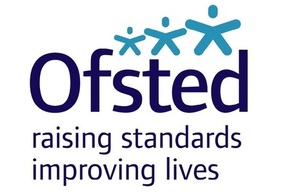Good early years get children off to a flying start, says Ofsted
Plans to ensure that good is the only acceptable standard of education and care provided by nurseries, pre-schools and childminders

ofsted logo
Her Majesty’s Chief Inspector, Sir Michael Wilshaw, formally launched a consultation on changes to the inspection framework aimed at improving the quality of early years provision during a visit to the Thomas Coram Early Childhood Centre, in central London.
Inspection evidence shows nurseries, pre-schools and childminders are not improving fast enough.
At the end of August 2012, up to 243,400 children were being cared for in early years providers that were not yet good. This represents almost 22% of the places available in the sector. Ofsted’s last Annual Report showed that 40% of early years providers had been judged satisfactory for two consecutive inspections – and 11% had gone down a grade.
Poor quality early years care and education is a particular problem in the poorest areas, where Ofsted has found that providers are less likely to improve between inspections than those in more prosperous areas.
Under the proposed changes that will come into force from this September, only a good or better standard of early years provision will be deemed good enough by Ofsted. The proposals will raise expectations and tackle weaker settings.Ofsted’s consultation proposes:
- a judgement of ‘requires improvement’ to replace the current ‘satisfactory’ judgement for all early years providers, to bring them in line with the standards already expected of schools and colleges
- for nurseries and pre-schools ‘requiring improvement’, increasing the frequency of inspections and imposing a maximum of four years to get to ‘good’. If a nursery or pre-school fail to become ‘good’ after two consecutive inspections, it is likely they will be judged ‘inadequate’
- where an inadequate early years setting fails to improve sufficiently and is still judged to be ‘inadequate’ after re-inspection, it is likely steps may be taken to cancel that setting’s registration
Ofsted will also strengthen registration and ensure rigorous enforcement for those who are not improving fast enough, and those failing to comply with requirements set out in the Early Years Foundation Stage (EYFS).
Sir Michael said:
We all know from the research that children’s early years are a period of rapid development and vital for building a secure foundation for future personal and academic success.
Parents, whatever their circumstances, want their children to access good quality childcare and get a good early education that sets them up well for statutory schooling. Yet too many providers are not good enough, particularly in the most deprived areas. We must be tougher on weak settings. From September 2013, nurseries and pre-schools judged less than good will need to improve rapidly. I want the new designation of ‘requires improvement’ to act as a catalyst to get all early years providers to good as soon as possible.
We’ll encourage providers that are good or outstanding to support weaker settings. We know that the best schools are joining forces and we anticipate that this will happen in the early years.
Sir Michael said that Ofsted will also be sharper about reporting on the levels of qualifications held by early years staff.
He said:
We know that staff expertise and qualifications make a distinct difference to the richness of young children’s experiences and that there is a clear correlation between the quality of provision and the level of staff qualifications.
The consultation closes on 24 May 2013. The revised framework is set to take effect from September 2013.
Bernadette Duffy, Head of Thomas Coram Centre said:
We support Ofsted’s view that all young children should have the best education in their early years and the opportunity to thrive in whatever school or setting they attend. At the moment too many young children attend settings that are not yet good or better and we need to be doing all we can through the inspection process to help practitioners in these settings. These are crucial years in children’s lives and it is vital that they are in settings that promote their well-being now and give them the best foundation for the future.
Notes to editors
-
The ‘Good early years provision for all’ consultation opened on 19 April 2013 and closes on 24 May 2013.
-
The government is considering proposals for childminder agencies. Ofsted is not making proposals about the early re-inspection of childminders at this time. Ofsted will consult on inspections of childminders, including those who join a childminder agency.
-
Ofsted also inspects children’s centres. The framework for the inspection of Sure Start children’s centres implemented in April 2013 can be found on the Ofsted website.
-
The Office for Standards in Education, Children’s Services and Skills (Ofsted) regulates and inspects to achieve excellence in the care of children and young people, and in education and skills for learners of all ages. It regulates and inspects childcare and children’s social care, and inspects the Children and Family Court Advisory Support Service (Cafcass), schools, colleges, initial teacher training, work-based learning and skills training, adult and community learning, and education and training in prisons and other secure establishments. It inspects services for looked after children, safeguarding and child protection.
Media enquiries
Clive House
70 Petty France
London
SW1H 9EX
Email pressenquiries@ofsted.gov.uk
Monday to Friday, 8:30am to 6pm 0300 013 0415
Out of hours duty press officer 07919 057 359